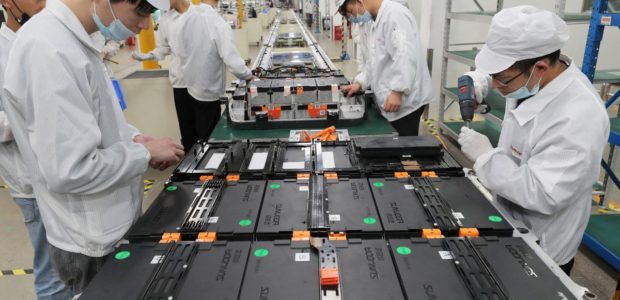|
Getting your Trinity Audio player ready...
|
The U.S. Department of Energy (DOE) has issued two notices of intent to provide US$2.91 billion in a drive to boost production of the advanced batteries that are critical to rapidly growing clean energy industries of the future, including electric vehicles and energy storage. The Department revealed that it plans to fund battery materials refining and production plants, battery cell and pack manufacturing facilities, and recycling facilities that create good-paying clean energy jobs.
This is welcome news for all stakeholders in the US supply chain with the funding expected to be made available in the coming months. The DOE is confident that the investment will ensure that the United States can produce batteries, as well as the materials that go into them, to increase economic competitiveness, energy independence, and national security.
The funding itself is a result of the Bipartisan Infrastructure Law and the DOE hopes the funding will allow it to support the creation of new, retrofitted, and expanded domestic facilities for battery recycling and the production of battery materials, cell components, and battery manufacturing. The funding is also designed to support research, development, and demonstration of second-life applications for batteries once used to power EVs, as well as new processes for recycling, reclaiming, and adding materials back into the battery supply chain.
The funding is the tangible end result of a 100-day review of the large-capacity-battery supply chain which was published by the DOE in June 2021. One of the most important takeaways from this review was the recommendation that it was key for the US to establish domestic production and processing capabilities for critical materials to support a fully domestic end-to-end battery supply chain. President Biden’s Bipartisan Infrastructure Law has resulted in nearly $7 billion being allocated to strengthening the U.S. battery supply chain, which includes producing and recycling critical minerals without new extraction or mining, and sourcing materials for domestic manufacturing.
Announcing the funding, U.S. secretary of energy Jennifer M. Granholm declared “As electric cars and trucks continue to grow in popularity within the United States and around the world, we must seize the chance to make advanced batteries — the heart of this growing industry — right here at home. With funding from Bipartisan Infrastructure Law, we’re making it possible to establish a thriving battery supply chain in the United States.”
This funding comes at a critical moment for the industry with the global lithium-ion battery market expected to grow rapidly over the next decade. DOE is confident that this latest funding will enable the United States to be suitably prepared for market demand. The Department believes that responsible and sustainable domestic sourcing of the critical materials used to make lithium-ion batteries — such as lithium, cobalt, nickel, and graphite — will help close the gap in supply chain disruptions and accelerate battery production in America.


